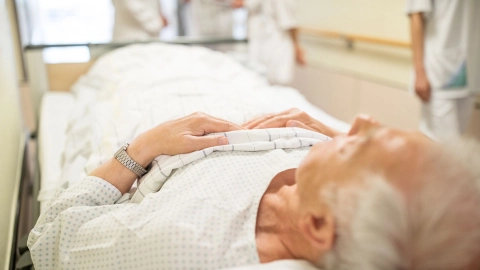Conditions Kidney cancer
ICD codes: C64 What are ICD codes?
Around 15,000 people get kidney cancer every year in Germany. This article provides an overview of the risk factors, typical symptoms, diagnosis, and therapy options for kidney cancer.
At a glance
- Kidney cancer is also known as renal cell cancer or renal cell carcinoma.
- Kidney cancer is a less common tumor illness. Some people may have an inherited or familial risk of kidney cancer.
- In its early stages, kidney cancer is only rarely accompanied by symptoms. Doctors usually discover kidney cancer by accident.
- With localized kidney cancer the aim is to fully remove the tumor and cure the patient.
- If the kidney cancer has spread to the body, it is usually incurable. Doctors usually treat kidney cancer with metastases with targeted therapy and immunotherapy.
- Chemotherapy usually has no role to play in kidney cancer.
Note: The information in this article cannot and should not replace a medical consultation and must not be used for self-diagnosis or treatment.

What is kidney cancer?
Kidney cancer is what medical practitioners call malignant tumors that occur in the kidneys. There are different types of kidney cancer. The most common is the renal cell carcinoma, which starts with certain cells in the kidney tissue. This article only deals with renal cell carcinoma.
Kidney cancer usually only occurs in one kidney; cancer in both kidneys is rare.
Location of the kidneys in the human body: people normally have two kidneys.
What are the symptoms of kidney cancer?
Doctors usually discover kidney cancer “by accident”, i.e. when they examine the abdomen for other medical reasons. The disease is then usually in its early stage and patients do not have any symptoms. Only when the disease advances can symptoms appear.
The following symptoms may indicate kidney cancer:
- bloody urine
- pain in the side of the back
- high blood pressure that has recently appeared
- swollen legs
- non-specific symptoms such as persistent high temperature, fatigue, and loss of weight
Some symptoms, such as swollen legs, high temperature, or loss of weight do not only occur with kidney cancer, but with other, benign conditions. If the symptoms persist over several weeks, a visit to the doctor is recommended. General Practitioners can already narrow down what is causing the symptoms and, if necessary, initiate further diagnostic steps with specialists.
Kidney cancer: what are the causes and risk factors?
In terms of the causes of, and risk factors for, kidney cancer, the research differentiates between controllable and non-controllable factors. Doctors recommend avoiding controllable risk factors, such as smoking and obesity. If a person has high blood pressure, a good blood pressure level can reduce the risk of kidney cancer.
Non-controllable risk factors include a family predisposition, for example. Examples of indicators of an inherited risk of disease include:
- The patient is aged 46 or below.
- Patients have tumors in both kidneys.
- Family members have or have had a kidney tumor.
People with indicators of an inherited predisposition should be given the opportunity of genetic counseling by a doctor. Various changes in the genetic makeup are known to be able to cause kidney cancer. They can be revealed by genetic testing. Anyone affected who has inherited this type of change can be offered tests to detect the cancer as early as possible.
However, there is no statutory nationwide screening program for kidney cancer in Germany.
Which tests does a kidney cancer diagnosis involve?
When there is a suspicion of renal cell carcinoma, a range of diagnostic methods which complement one another are available to doctors.
To start with, there is always the basic diagnosis, which consists of the following elements:
- question the patient (case history) about pre-existing conditions, symptoms, and family history
- physical examination
- determining blood values
- imaging methods such as ultrasound, computed tomography (CT), and magnetic resonance tomography (MRT)
- possibly taking tissue samples and their histological examination
General practitioners can take the first steps of a basic diagnosis themselves. Specialists such as urologists and radiologists are responsible for subsequent steps. Specialist outpatient clinics also have trained staff and the medical equipment required.
Tissue samples (biopsies) from the kidney tumor are not needed with all patients. If the diagnosis is relatively safe and the doctors plan to remove the tumor, some patients do not need to have a biopsy beforehand. However, if surgery does not seem to make sense, the urologist must take samples and confirm the kidney cancer by studying the tissue.
Would you like to know more about the various test methods? The website of the Cancer Information Service of the German Cancer Research Center has background information on the various diagnostic methods and how they work (in German).
How is kidney cancer treated?
Doctors treat kidney cancer in different ways, depending on the stage of the tumor. With renal cell carcinoma, a distinction is drawn between three stages:
- localized (early): the cancer is only growing in the kidney.
- localized advanced: the cancer cells are growing beyond the kidney, but they remain within the protective capsule (Gerota’s fascia).
- metastatic: the cancer cells are spreading through the Gerota’s fascia, for example to the adjacent kidney, or to other organs.
Video How is cancer treated?
The video below explains how cancer can be treated.
This and other videos can also be found on YouTube
Watch nowThe privacy policy indicated there applies.
Treatment of early and localized advanced kidney cancer
If the cancer is growing inside the kidney or its protective capsule, doctors can usually remove the entire tumor with surgery. They generally try to preserve the kidney in such cases. The operation is the main therapy for curing patients. However, a long-term cure is not always possible: with some patients the kidney cancer returns, for example in the kidney area or as metastases. There are then other therapy methods.
If surgery is not possible, for example for reasons of age, doctors can destroy the cancer tissue locally. Heat or cold can be deployed to destroy cancer tissue locally. Specialists refer to this method as ablation: however it is only an option for small kidney tumors, i.e. if they are no bigger than 4 cm.
Treatment of metastatic kidney cancer
If the renal cell carcinoma has spread, a cure is not usually possible. Then drugs that act on the body as a whole can keep the disease in check and alleviate symptoms. With these systemic therapies the doctors often combine various agents with one another. These include the following therapy methods:
- So-called targeted therapies: drugs are used to attack particular features of cancer cells. Healthy cells have little or none of these features.
- Immunotherapy: drugs stimulate certain of the body’s own defense cells to fight the cancer cells themselves.
- Supportive treatment methods: these include ways of alleviating adverse symptoms and improving the general quality of life.
Video What are targeted cancer therapies?
The video below explains when targeted cancer therapies are used. How are these drugs used and how do they work?
This and other videos can also be found on YouTube
Watch nowThe privacy policy indicated there applies.
Important: Chemotherapy is usually ineffective with kidney cancer, unlike with many other types of cancer. Doctors usually only use radiotherapy in certain cases, for example if the tumor has formed metastases in the lung, skeleton, or brain.
Would you like to know more about the different treatment options for kidney cancer? The website of the Cancer Information Service of the German Cancer Research Center has more information on therapy for renal cell carcinoma (in German).
What happens after kidney cancer is treated?
Cancer treatment can be physically and mentally exhausting. Medical rehabilitation (rehab) after cancer therapy aims to help patients regain their strength. It also aims to help them deal with the consequences of the disease and treatment in the best possible way.
Rehab for kidney cancer patients is specialized, i.e. the program includes specialized urological care. In general, urological rehab is based around the person’s medical history, the specific therapy and the limitations that exist.
A urological rehab program after kidney cancer therapy may include:
- exercise therapy, possibly targeted physiotherapy to prevent abdominal weaknesses after the kidney surgery
- lifestyle advice, for example for the best possible maintenance of the kidney function
- nutritional advice and recommendations on drinking behavior
- options for learning relaxation techniques
- psychological support
What’s next? Aftercare, and kidney cancer checkups
Kidney cancer aftercare is intended to detect any recurrence at an early stage as well as any delayed effects of the treatment. Once treatment has been completed, patients are examined regularly, initially at short intervals, then at longer ones. The doctors ask about symptoms and examine the body, blood pressure and blood values. They also offer imaging procedures.
However, if patients have any problems they can also visit their doctor more often. If the cancer is incurable, regular checkups help to identify adverse symptoms at an early stage. The aim is to maintain the patient’s quality of life for as long as possible.
What is life like with kidney cancer?
Many kidney cancer patients want to take an active part in contributing to their recovery. There are a number of ways they can do this. What can help them to cope better with the disease and the consequences of treatment depends on the individual situation:
- Activity can help overcome tiredness and weakness. Patients should adjust this to suit their own capabilities.
- A balanced, healthy diet or nutritional therapy can prevent or treat malnourishment.
- Psycho-oncological counseling can help to overcome worries and fears.
If it is no longer possible to cure the cancer and it is becoming more advanced, good medical and nursing care are very important. Adverse symptoms such as pain and breathlessness can be alleviated. And psychosocial support can help maintain quality of life for as long as possible.
What are the best points of contact for kidney cancer?
Doctors with different specializations work closely together to treat kidney cancer. Hospitals that are particularly experienced in treating patients with kidney cancer can get certification to prove this. The German Cancer Society (DKG) regularly checks their compliance with certain professional requirements.
You can find the addresses of the certified centers on the OncoMAP website.
Urological clinics and medical practices can be found on the Urological Health Foundation (Urologische Stiftung Gesundheit) patient portal of the German Society of Urology (Deutsche Gesellschaft für Urologie e.V.).
Do you have further questions about dealing with the condition in everyday life and additional support options? The website of the Cancer Information Service of the German Cancer Research Center provides a wide range of information (in German).
You can also contact the Cancer Information Service directly on freephone 0800 - 420 30 40 or by e-mail at krebsinformationsdienst@dkfz.
- Deutsche Krebsgesellschaft, Deutsche Krebshilfe, AWMF. Diagnostik, Therapie und Nachsorge des Nierenzellkarzinoms. Langversion 5.0. S3-Leitlinie. AWMF Registernummer 043/017OL. 09.2024.
- Zentrum für Krebsregisterdaten (ZfKD) des Robert Koch-Instituts (RKI). Nierenkrebs. Aufgerufen am 28.12.2021.
In cooperation with the Cancer Information Service of the German Cancer Research Center (Krebsinformationsdienst des Deutschen Krebsforschungszentrums).
As at:





